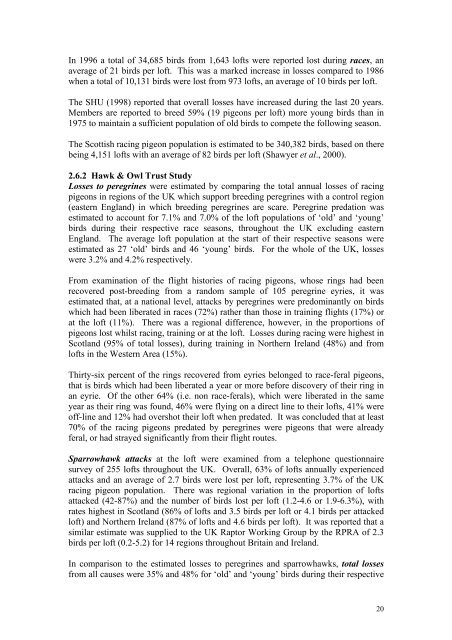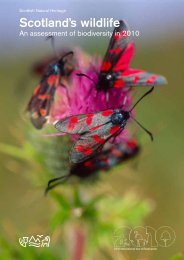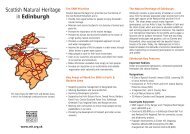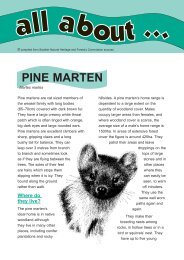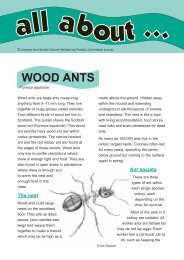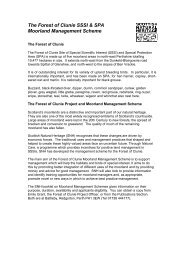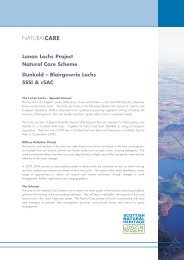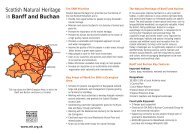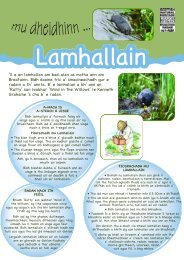RACING PIGEONS â IMPACT OF RAPTOR PREDATION
RACING PIGEONS â IMPACT OF RAPTOR PREDATION
RACING PIGEONS â IMPACT OF RAPTOR PREDATION
Create successful ePaper yourself
Turn your PDF publications into a flip-book with our unique Google optimized e-Paper software.
In 1996 a total of 34,685 birds from 1,643 lofts were reported lost during races, an<br />
average of 21 birds per loft. This was a marked increase in losses compared to 1986<br />
when a total of 10,131 birds were lost from 973 lofts, an average of 10 birds per loft.<br />
The SHU (1998) reported that overall losses have increased during the last 20 years.<br />
Members are reported to breed 59% (19 pigeons per loft) more young birds than in<br />
1975 to maintain a sufficient population of old birds to compete the following season.<br />
The Scottish racing pigeon population is estimated to be 340,382 birds, based on there<br />
being 4,151 lofts with an average of 82 birds per loft (Shawyer et al., 2000).<br />
2.6.2 Hawk & Owl Trust Study<br />
Losses to peregrines were estimated by comparing the total annual losses of racing<br />
pigeons in regions of the UK which support breeding peregrines with a control region<br />
(eastern England) in which breeding peregrines are scare. Peregrine predation was<br />
estimated to account for 7.1% and 7.0% of the loft populations of ‘old’ and ‘young’<br />
birds during their respective race seasons, throughout the UK excluding eastern<br />
England. The average loft population at the start of their respective seasons were<br />
estimated as 27 ‘old’ birds and 46 ‘young’ birds. For the whole of the UK, losses<br />
were 3.2% and 4.2% respectively.<br />
From examination of the flight histories of racing pigeons, whose rings had been<br />
recovered post-breeding from a random sample of 105 peregrine eyries, it was<br />
estimated that, at a national level, attacks by peregrines were predominantly on birds<br />
which had been liberated in races (72%) rather than those in training flights (17%) or<br />
at the loft (11%). There was a regional difference, however, in the proportions of<br />
pigeons lost whilst racing, training or at the loft. Losses during racing were highest in<br />
Scotland (95% of total losses), during training in Northern Ireland (48%) and from<br />
lofts in the Western Area (15%).<br />
Thirty-six percent of the rings recovered from eyries belonged to race-feral pigeons,<br />
that is birds which had been liberated a year or more before discovery of their ring in<br />
an eyrie. Of the other 64% (i.e. non race-ferals), which were liberated in the same<br />
year as their ring was found, 46% were flying on a direct line to their lofts, 41% were<br />
off-line and 12% had overshot their loft when predated. It was concluded that at least<br />
70% of the racing pigeons predated by peregrines were pigeons that were already<br />
feral, or had strayed significantly from their flight routes.<br />
Sparrowhawk attacks at the loft were examined from a telephone questionnaire<br />
survey of 255 lofts throughout the UK. Overall, 63% of lofts annually experienced<br />
attacks and an average of 2.7 birds were lost per loft, representing 3.7% of the UK<br />
racing pigeon population. There was regional variation in the proportion of lofts<br />
attacked (42-87%) and the number of birds lost per loft (1.2-4.6 or 1.9-6.3%), with<br />
rates highest in Scotland (86% of lofts and 3.5 birds per loft or 4.1 birds per attacked<br />
loft) and Northern Ireland (87% of lofts and 4.6 birds per loft). It was reported that a<br />
similar estimate was supplied to the UK Raptor Working Group by the RPRA of 2.3<br />
birds per loft (0.2-5.2) for 14 regions throughout Britain and Ireland.<br />
In comparison to the estimated losses to peregrines and sparrowhawks, total losses<br />
from all causes were 35% and 48% for ‘old’ and ‘young’ birds during their respective<br />
20


